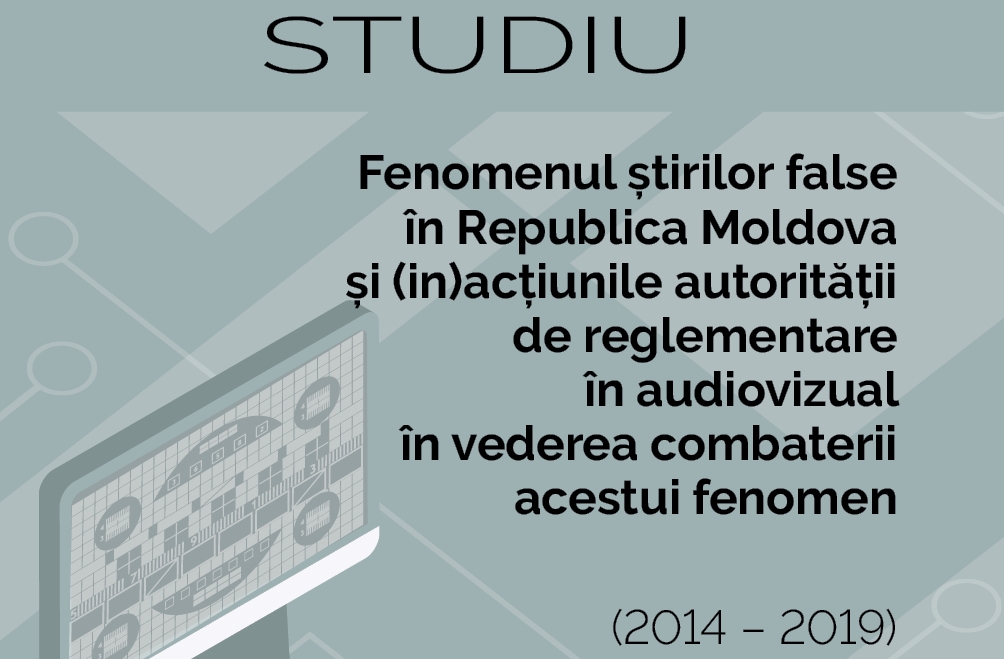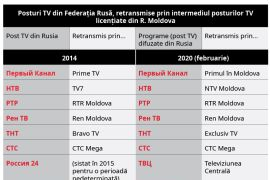back
API Study: What Does Broadcast Council Do To Combat Fake News and Propaganda?

During the Press Freedom Days, the Association of Independent Press (API) launches the study “Fake News in Moldova and Regulation Authority’s (In)Actions to Combat It.” The study looks at the evolution of the fake news phenomenon in the media in the period from 2014 to 2019 and the Broadcast Council’s activities in that period to combat external and internal propaganda on TV and radio. The publication was issued during the Campaign Against Fake and Biased News STOP FALS!
The study’s author Olga Guțuțui, ex-member of the Broadcast Council (BC) from April 2015 to 15 November 2019, when she resigned in protest, stating that, ‘from a guarantor of the public interest in broadcasting, the Council has turned into a guarantor of the political interest in broadcasting’.
The study is structured in three sections and includes theoretical aspects of fake news, an overview of the forms of manifestation of this phenomenon in the Moldovan media from 2014 to 2019, a review of the BC actions to counteract disinformation, and a presentation of European Union’s policies and relevant regional experience in the context of information space protection against external propaganda influences.
After reviewing BC’s work of looking into monitoring reports, complaints and actions taken on one’s own regarding fake news, the sanctions imposed as well as the decisions to grant broadcast licenses, the study’s author concludes that the broadcast regulation authority had failed the exam in protecting the information space and combating disinformation, manifesting itself as a passive player in this area and institutionally protecting politically affiliated stations. “While some states forbid the relay of Russian TV stations whose owners are in the list of sanctions against Russia after the illegal attachment of Crimea and while the European Parliament draws attention to the fact that the pro-Kremlin propaganda is the main source of disinformation in Europe, Moldova’s Broadcast Council further grants broadcast license to some media service providers for relaying Russian information products,” the study says. The number of TV stations that relay Russian broadcast content in the territory of Moldova thus increased from 7 in 2014 to 10 in February 2020, and this does not include the service distributors (cable companies) whose service packages mainly include Russian stations. In addition, “the Broadcast Council, for years in a row, has tolerated the operation of the self-declared radio station Sputnik Moldova Radio, which does not have a broadcast license for providing sound broadcast services and that, according to the European Parliament’s resolution, is recognized as a pro-Kremlin propaganda tool.”
In order to contribute effectively and efficiently to ensuring the country’s information security, the BC is recommended to study the experience and practices of the countries in the region that have been facing the same challenges and to ensure the application of the legal mechanisms of protection of the domestic information space. The BC must also monitor on a permanent basis the observance of the legal provisions in this area and impose sanctions unselectively, depending on the names of the actual or ‘shadow’ beneficiary owners of TV and radio stations. The granting of licenses to broadcast companies that intend to broadcast/relay programs from Russia must be preceded by a monitoring of the compliance of such programs with the national legislation and the decisions should be made based on the monitoring results. The BC should also take over the experience of the Baltic States and not allow that the persons put on the EU’s list of sanctions after the violation of Ukraine’s territorial integrity hold media properties in Moldova. In the context of the future presidential elections, the study recommends BC, that right after the date of the elections is announced, to start monitoring the national and regional broadcast media service providers, promptly sanctioning any violations, in order not to allow campaigns of disinformation of public opinion for election purposes to take place and, during the election campaign as such, to review the monitoring reports on a weekly basis.
The study “Fake News in Moldova and Regulation Authority’s (In)Actions to Combat It” may be downloaded from the website Api.md (API’s Publications/Brochures rubric) and on the portal Stopfals.md (StopFals Campaign/Studies, comments rubric).
For additional information: tel.: (022) 220996 sau e-mail: api@api.md.
